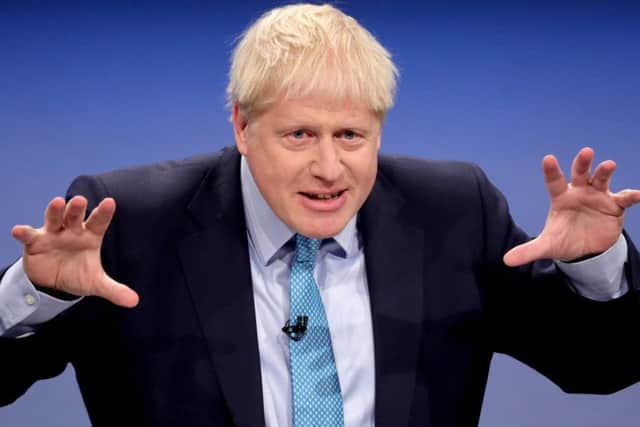How Boris Johnson is morphing into a slapdash John McDonnell – Joyce McMillan


Wednesday morning; and in Manchester, the Prime Minister is making his speech to the Conservative Party conference. Despite his inflated reputation as a wit, Boris Johnson is not a great public speaker, and the response from the faithful seems more warmly supportive than ecstatic.
As the speech finishes, though – with much emphasis from most commentators on the new Brexit proposals – the eye is caught by a tweet from political journalist Robert Peston. He gives a brief summary of Johnson’s non-Brexit policy proposals, and then adds, “That was Boris Johnson saying ‘I hate being called an extreme right-wing ideologue’”.
Advertisement
Hide AdAdvertisement
Hide AdIt was a surprising phrase; for if there is one thing about which this Prime Minister can feel confident, it is surely that no-one has ever mistaken him for an ideologue, of any stripe. On the contrary, he has made it crystal clear – particularly with his theatrical decision about which column to file, Remain or Leave, on the eve of the EU referendum campaign – that he is the complete political opportunist, ready to climb into bed with anyone at all, in order to keep his chubby fist crammed into the big sweetie jar of political fame and recognition that seems so necessary to his emotional equilibrium.


And in that sense, his status as the current leader of the Conservative Party seems oddly appropriate; for if every detail of the Labour Party’s post-2010 transition from Blairism back to 1945-style social democracy has been subjected to near-hysterical levels of media scrutiny, the Conservative Party has also been undergoing a remarkable transition over the last three years, and one which, beyond its obvious impact on Brexit policy, has been rather less well reported.
It has been widely observed, of course, that the party’s effort to destroy Ukip, in the early 2010s, led to it becoming much more like Ukip; by 2015, Tory MPs and party members were far more likely to be extreme Eurosceptics than in 2010. What has tended to escape notice, though, is that so far as British Conservatism is concerned, the discourse of anti-EU British nationalism has, over the past three years, all but replaced the discourse of economic neoliberalism as the party’s main rallying-cry and raison d’etre.
It’s not that there are no radical free-marketeers left in the party; on the contrary, many of the most devout supporters of Brexit are also those who want to see EU protections for everything from workers’ rights to the environment swept away, and great British public goods like the NHS opened up to global providers.
Increasingly patriotic tone
Yet search the party’s recent public rhetoric for any high-profile embrace of these policies, and you will largely search in vain. Instead, as Peston observed on Wednesday, the public tone is increasingly strongly patriotic, implicitly statist, and almost Gaullist in its attachment to grand government-driven projects that supposedly express the spirit of the nation, and offer the people the glory and security they deserve. Hence Johnson’s wish-list of domestic policies for a UK where incomes for the poorest are levelling up, where education, technology and infrastructure are booming thanks to massive government investment, and where the country leads the world in green technology. It’s all pretty vague, of course; but when he gets going, in this ‘one nation’ vein, Boris Johnson sounds surprisingly like a slapdash version of Labour’s John McDonnell – one who just has not bothered fully to cost his policies, or to analyse their real implications.
And beyond this sudden abandonment of the small-state rhetoric that has sustained the party for 40 years, there is one other consequence of the recent Tory transformation of which every Scot should take note; that after 20 years of blissful Westminster indifference to the entire radical fact of devolution, the Conservative and Unionist Party has suddenly, in its new British nationalist mood, fully noticed the existence of the Scottish Parliament and Government, and begun to take exception to it. Hence the new Tory obsession not only with undermining the Scotland Act so as to be able to retain powers in devolved areas at Westminster, but also with plastering Union flags and advertisements around Scotland, keeping Nicola Sturgeon – as Johnson charmingly put it – from getting “anywhere near” next year’s global environmental summit in Glasgow, and, in the words of one infant Tory, lamenting the strategic error of “giving Edinburgh Castle to the Scottish Government” – although in fact the Castle is mainly used by the army, and always flies a large Union flag, day and night.
Consequences for Scotland
The signs, in other words, are that before this Tory transformation into a party of retro British nationalism has run its course, things could turn quite nasty, for those of us who are interested in the diversity of these islands, and in the need to cherish and respect those cultural and political differences. The current fashion, it seems – in Washington, London, Madrid and elsewhere – is for old-style big-state nationalism based on old-style lies about national unity and homogeneity, with all the attendant risk of increasingly bitter hardline responses from those excluded and marginalised by those lies. This is the process of deterioration so much feared by the majority in Northern Ireland, as this new wave of British nationalism lays waste to the necessary complexities of the Good Friday Agreement; and it is a process which will also have consequences for Scotland, and for the quality of our own political life.
Since Boris Johnson is not a ideologue, though, he will not be giving deep consideration to any of this, this weekend. If he were, some of the profound contradictions in his situation might bother him more – not least the fact that he is promising state largesse while driving the country towards a huge and debilitating economic crisis, and being backed by some of the most powerful anti-state ideologues on the planet. And if the consequences of his policies for many of the rest of us hardly bear thinking about... well, as we have seen, deep thought is not Boris Johnson’s strong suit; a fact that is probably as good for his own emotional health, at the moment, as it is dangerous for the country he now claims to lead.